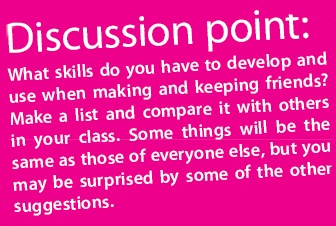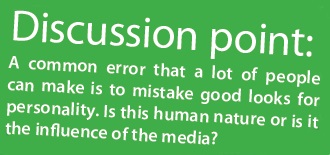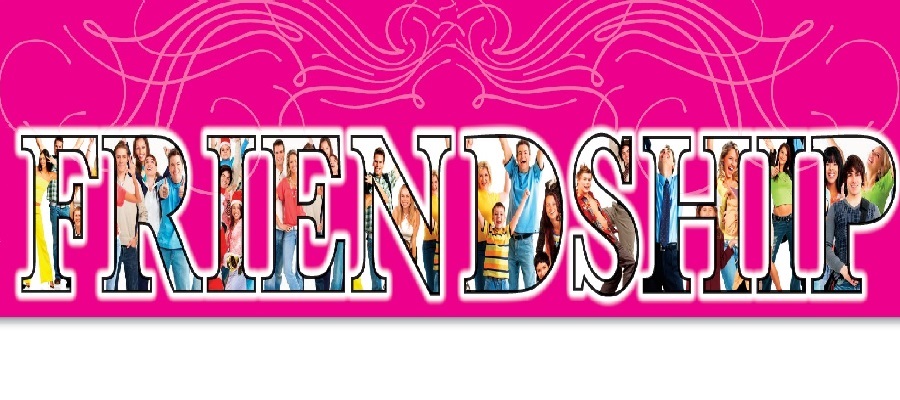 Aristotle wrote, “The desire for friendship comes quickly. Friendship does not.” The truth is that time is not the only factor that aff ects a relationship. You have all asked yourselves questions such as: “Why is she so popular?” “How can I become his friend?” “Does anyone like me?” These questions are connected to one of the bigger questions that most of us ask from time to time throughout our lives: why are relationships so complicated? Humans are social creatures; we have a basic need to interact and make a connection with others. However, due to1 our individuality, complications can arise that influence our choice of friends. Making friends can become a social minefield where putting a foot wrong can be, at best, relatively harmless but at worst, disastrously embarrassing.
Aristotle wrote, “The desire for friendship comes quickly. Friendship does not.” The truth is that time is not the only factor that aff ects a relationship. You have all asked yourselves questions such as: “Why is she so popular?” “How can I become his friend?” “Does anyone like me?” These questions are connected to one of the bigger questions that most of us ask from time to time throughout our lives: why are relationships so complicated? Humans are social creatures; we have a basic need to interact and make a connection with others. However, due to1 our individuality, complications can arise that influence our choice of friends. Making friends can become a social minefield where putting a foot wrong can be, at best, relatively harmless but at worst, disastrously embarrassing.
Since our birth, family relationships have played a major part in our lives. Although we had no control and little choice over these relationships, we would have learned the basics of interaction, both consciously and instinctively, from our families. Of course, there are also drawbacks2. Our lack3 of choice can occasionally make family relationships difficult. Ask any family how tricky their relationships can be and you will  get similar stories of embarrassment, misunderstandings, frustration and arguments. These early relationships form a large part of our development and allow us to practice using most of the skills that we rely on when making friends outside of the family.
get similar stories of embarrassment, misunderstandings, frustration and arguments. These early relationships form a large part of our development and allow us to practice using most of the skills that we rely on when making friends outside of the family.
As teenagers, each of you is still a ‘work in progress’; your personalities are becoming fully formed. You understand empathy4, have developed a degree of self-awareness5 and, by now, you are a lot more sensitive to the complex signals sent out by your peers6. When growing up, we also begin to make more considered decisions about those we choose to be our friends. There are a number of things that infl uence our decisions regarding friendships. These influences include; peer groups, teen magazines, television, social networking sites, blog sites (including video), movies, music and fashion. These are powerful forces, and their influence is hard to ignore. However, one of the most important factors is personality.
Personality is very important when making a decision about someone. Studies show that our personalities will influence the kind of people we are drawn to. There are a number of distractions7 that can interfere with our choice of friends. Your generation, more than any previous generation of teens, is being targeted by more programming and advertising due to the media’s current obsession with youth, beauty and fame. They tell you that you need to look a certain way, dress a certain way, behave in a certain way, and aspire to be a certain type of person. Add to this your natural tendency to want to display your own identity, and the resulting confusion is understandable.  Many of the products and lifestyle choices offered to you are impossible to live up to, and the resulting failure8 can affect your development. It is very hard to know what or who to trust.
Many of the products and lifestyle choices offered to you are impossible to live up to, and the resulting failure8 can affect your development. It is very hard to know what or who to trust.
A sense of belonging is very important to people, especially when you are young. Groups or cliques9 are comfortable and comforting. They offer security and identity. Naturally we seek to be with those whom we feel share our interest and desire. It may be doing the same sports, following similar bands or enjoying particular online communities. Some cliques can exert10 a great deal of power and, in some cases, dictate trends, fashions and what’s cool within a school. On the other hand, a clique can also be anti-social, demanding and cruel to those both inside and outside of the group. In order to ensure conformity, these groups oft en try to suppress individual identity. The kind of herd behaviour11 encouraged by these groups limits individual potential as it discourages personal expression. Cliques can sometimes deliberately exclude individuals that members deem12 ‘unsuitable’.
In some cases, the isolation of excluded individuals can lead to loneliness. To feel like an outsider or friendless can be very destructive and lead to thoughts of negativity, especially in young people. These thoughts can be harmful to one’s self-esteem13 and personal development and may lead to issues regarding lack of self-confi dence14. It is important to try to form groups that are open and value individuals for who they are. In order for any relationship to flourish, good communication would have to be at its heart. Friendships may break down for a number of different reasons, but they will always suffer when communication fails. Complete honesty is also essential. This means opening up and allowing the other person to see and accept your weaknesses. The things that draw you closest will be triumphs over problems that are shared. Friends will occasionally argue and sometimes disagree with each other, but when the fundamental bond15 is secure and built on trust, there is no danger to the friendship. Friendship can be described as a relationship between people who share trust, affection, loyalty, and mutually supportive behavior — the things that connect them with a bond that can be stronger than any familialtie. These are just a few of the qualities that are needed to navigate the often-hazardous landscape of relationships.
Exercise
Studies have shown that there are 5 main personality traits16 that each of us display to a greater or lesser degree. These five personality traits can be simply described as Outgoing17, Cautious18, Organised, Agreeable and Open.
Read the statements in the table below. The numbers signify the extent to which you believe each statement represents you. Circle the number that you think is closest to describing you.
Key: 1 = mostly, 2 = sometimes, 3 = neither, 4 = sometimes, 5 = mostly.

Once you have completed this test yourself, you might want to invite a friend to fill in the test and give their opinion of you. You can then compare how you see yourself and how others see you.
Milton P. Reynolds
Vocabulary: 1kvôli – kvůli; 2nevýhoda; 3nedostatok – nedostatek; 4empatia, schopnosť vcítiť sa – empatie, schopnost vcítit se; 5uvedomie si sám seba – vědomí sama sebe; 6vrstovník – vrstevník; 7rozptýlenie – rozptýlení; 8/feilj∂r/ neúspech, prehra – neúspěch, prohra; 9/kli:k/ partia – parta; 10/igz∂:t/ uplatniť – uplatnit; 11správanie stáda – chování stáda; 12/di:m/ považovať – považovat; 13sebaúcta; 14sebadôvera – sebedůvěra; 15puto – pouto; 16rys, stránka; 17spoločenský, otvorený –společenský, otevřený; 18/ko:š∂s/ opatrný

